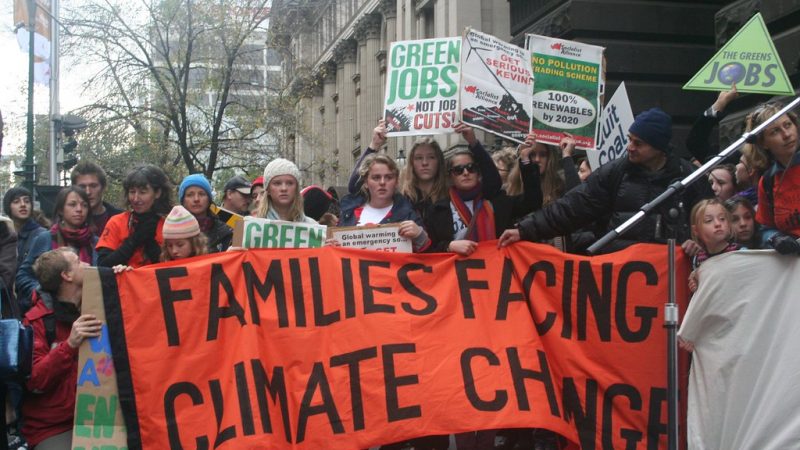'Reparations - partly but certainly not only in the form of “loss and damage” - are essential, and need to be guaranteed at this COP climate talks'

Natalie Bennett is a Green Party peer and a Contributing Editor to Left Foot Forward.
Estimates put the likely damage from the growing climate emergency (the world now 1.1 degrees Celsius above pre-industrial levels, but threatening to reach 1.5 by the end of the decade) at between US$290 billion and $580 billion A YEAR. Think back over the year we’ve had, even in the Global North – fires in the US and Australia, floods in continental Europe – and it isn’t hard to see how the total adds up.
But in events at COP, the climate disasters that get vastly less attention – both physical and social – are brought sharply into focus. In a Green Party event on reparations, I heard human rights lawyer Snigdha Tiwari from the Indian part of the Himalayas, speak about communities local to her hit by massive floods, hundreds dead and many homeless. With She Changes Climate, I heard from climate activist Marinel Ubaldo from the Philippines about how after Super Typhoon Haylan teenage girls were taken from school and sent to the cities to work as maids, due to their families’ desperate financial straits – scarring their prospects for life.
In the Global South, governments don’t have disaster relief funds ready to pump into affected areas. In the Global North, most people – although of course often not the poorest – have insurance, but not in the South.
That’s what “loss and damage” payments agreed in the Paris climate deal – known as the “Third Pillar” – were supposed to deal with. And also agreed was the establishment of the Santiago Network, designed as a squad of technical experts to provide support at times or crisis, and help plan for recovery. Also agreed then was the need for adaptation – preparatory actions, from flood walls to landuse change to sturdier housing – to prevent climate extremes becoming disasters, and save lives if they do.
Yet adaptation has always been the poor relation in climate action. Mitigation – cutting the emissions of greenhouse gases – has got far more attention, and funding. Of the climate finance allocated – yet to meet the promised $100 billion a year – only about 20% has gone to mitigation, a grossly inadequate sum.
And there’s huge concerns about the nature of the climate finance. Initially conceived as grants, it been converted to loans, and about 40% of the loans at commercial rates. It’s hard to see why it should be in this special category at all. It is a money-making effort by the lenders.
And as Martin Ogindo of the Green Congress of Kenya told a Green Party fringe event at COP: “The Global South is choking in loans.” It lacks the fiscal space to take out any more.
The Green Party event was looking at “loss and damage” in a broader framework, of reparations, something the party called for at a recent conference, an acknowledgement – and recompense for – the massive damage done by colonialism and neocolonialism, and racism, against the Global South and minoritised communities in the North. The impact of the climate emergency is just one more cause of vehicle of destruction, after the extractivisim of mining, commodities being taken at far less than their true value and labour exploitation.
That’s an account that it’s time to repay. It’s a responsibility of nations – as Green MSP Mark Ruskell noted at another fringe event – in the grand buildings of Glasgow, and even the names of the streets, that colonial legacy is all around the COP conference.
But Snigda Tiwari made a more direct claim. Given that much of the climate damage can be attributed to a small number of companies, why should they not be forced to directly pay for the damage? The treatment of the Earth is criminal, as I reflected at another event calling for the crime of ecocide to be added to the Rome Statute, and many of those criminals are easily identifiable.
Whatever the mechanism, it is clear that reparations – partly but certainly not only in the form of “loss and damage” – are essential, and need to be guaranteed at this COP climate talks. That must be shouted from the rooftops as the discussions enter their final stages.
The moral case is overwhelming, but even for those who reject that, there’s a powerful practical argument: we can all only be secure in a stable world. And the current situation – where 20% of children under five are stunted due to malnourishment – is far from stable. Moreover, we are only likely to be able to tackle the enormous challenges facing us in the coming decades if we allow every human being on this planet to develop to their full potential, to use their energy and talents for the common good.
Left Foot Forward doesn't have the backing of big business or billionaires. We rely on the kind and generous support of ordinary people like you.
You can support hard-hitting journalism that holds the right to account, provides a forum for debate among progressives, and covers the stories the rest of the media ignore. Donate today.



